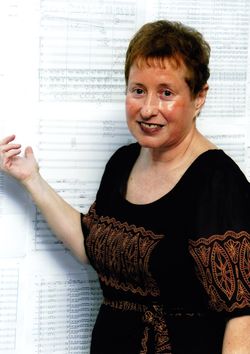Fleischer, Tsippi
Biography
Born: 1946
Country: Haifa, Israel
Studies: Rubin Academy (B.M.1960), NYUC (M.M.E.1975)
Teachers:
Website: http://www.tsippi-fleischer.com/
Already at the young age of four, she played and improvised on the piano by ear, and by the age of seven she had started private piano lessons and began learning the accordion independently.
Fleischer continued to study piano and theory at the Rubin Conservatory in Haifa. She matriculated from the Hebrew Reali High School in Haifa with a focus on Eastern studies and then went on to continue her studies for a teacher's certificate in music at the Levinsky School of Education in Tel Aviv. Her academic degrees include B.As in Hebrew Language, Arabic Language and Literature and the History of the Middle East from the Tel Aviv University; a B.A. in Theory, Composition and Conducting from the Rubin Academy of Music in Jerusalem; an M.A. in Music Education from New York University; an M.A. in Semitic Linguistics from Tel Aviv University and a PhD in Musicology from Bar Ilan University. Among her teachers were the composers Gyorgy Kurtag, Noam Sherrif, Mendi Rodan, Yitzhak Sadai, Haim Alexander as well as the musicologists Jan LaRue and Leonard Ratner.
During her studies, Fleischer also joined the teaching staff of the School of Music at the Levinsky School. Later, she also served as a guest lecturer in the Musicology Departments of Tel Aviv University, Bar Ilan University, the Department of Religious Music at Hebrew Union College in Jerusalem as well as in various universities in the United States and Germany. Among the subjects she taught were: harmony, counterpoint, and musical forms.
Likewise, Fleischer also promoted a number subjects such as a method of analysis which combined existing methods of musical analysis, history and improvisation in Jazz and Pop, harmonizing of songs, the history of Israeli song, Eastern and European music and the connections between them, and more.
In 1978, Fleischer married the linguist Aharon Dogolpolsky, who arrived in Israel from Moscow during the mass Aliyah from the Soviet Union in the 70's. Their son Jacob was born in 1982. Today he specializes in Biblical Studies.
Tsippi Fleischer's work in the field of music is cross disciplinary. First and foremost, she is known for her compositions for the concert stage that have multi-cultural musical and literary influences, both from the West- the classic and modern- and Palestine with its abundance of Jewish groups, communities of Muslims and Christians and ancient Near East Semitic civilizations. At the start of her professional career, she composed for theatre and dance and worked on arrangements. All the while, her virtuosity on the piano was become well known. Concurrently, she was also active in the field of Music Education in Israel and in the study of Hebrew Folksong.
Three main sources of inspiration, as mentioned above, served Fleischer in her variegated work, sometimes in conjunction, and sometimes separately: Eastern music, which started, for her, with the study of local Eastern music (scales and folklore) and culminated in the integration of non-Western musical traditions from all over the world into her music; Jewish music based on Biblical subjects and other sources from Jewish history; Israeli music which draws its inspiration from Israeli materials (Hebrew poets, the Israeli landscape, etc). All of these were then put into practice on the foundations of Western, Classic and Avant Garde Music.
Her unique style garnered her many prizes, among them the ACUM Prize (Israel Authors, Composers,Lyricists, Poets, Arrangers and Music Publishers) for her life's work in 2003. The Prime Minister's Prize on Israel's 50th anniversary (1998); Winner of the first World Competition of the Cambridge Singers Madrigal Composition Competition for composing an acapella work for Madrigal 1 from Scenes of Israel-Six Madrigals (1998); The Israeli Public Council of Art and Culture and Art Prize for Oratoria-1991- 1492 (1993); the "Globes" Award for the Foremost Career-Woman of Israel for 1993 in the field of Music, the Mark Lavry Prize of the Haifa Municipality for Lamentation, the ACUM prize for her work "Like Two Branches"(1994) in addition to fellowships from the Israeli government, the United States government, the government of Finland, the Brahms Society (Germany) and the Canadian Society for Electro-Acoustic music.[1]
Works for Percussion
War - Multiple Percussion - Marimba, Vibraphone, Electronic Drums; bass/contra-alto clarinets/saxophone (one player)
References
